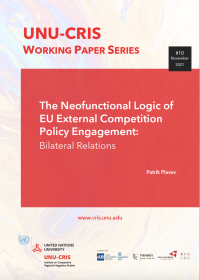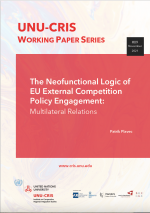The Neofunctional Logic of EU External Competition Policy Engagement: Bilateral Relations

This working paper examines the conditions under which the European Union (EU) engages externally in competition policy and tests the appropriateness of applying a neofunctionalist approach for specifying the conditions under which the EU engages externally in this policy area. The working paper examines the EU’s horizontal engagement through bilateral enforcement cooperation agreements, competition provisions in free trade agreements (FTA) and its role as a legislative model for unilateral adoption by third countries and regional blocs. Accordingly, by disaggregating the dependent variable of EU external engagement into four modes of engagement – policy export, policy promotion, policy protection and policy import – this study finds that neo-functionalism correctly specifies the conditions under which the EU engages externally in competition policy.
The working paper finds that where direct policy export through bilateral agreements is unfeasible, the EU seeks to engage in policy promotion horizontally through bilateral cooperation enforcement agreements and competition policy provisions in FTAs with major trade partners as a second-best mode of external engagement. Additionally, the study finds that the neofunctionalist approach also helps explain the documented incremental, unilateral adoption of EU competition policies and laws by third countries. The EU’s external engagement through bilateral agreements and policy diffusion is examined using a mixed methods approach.

